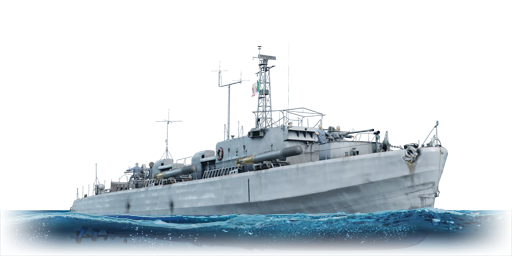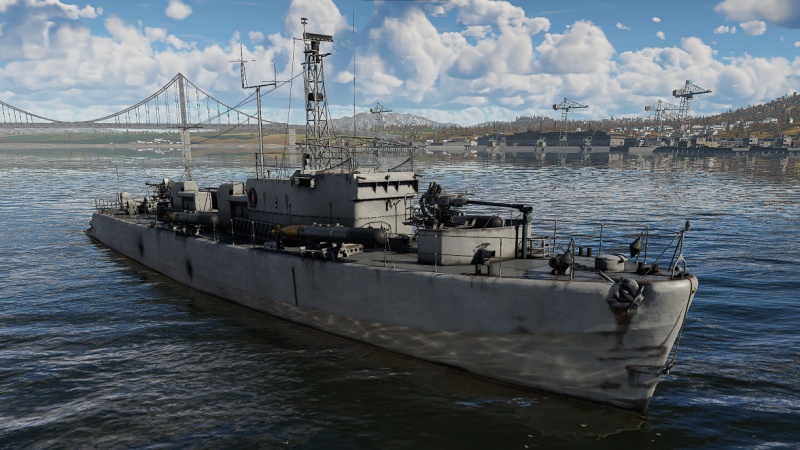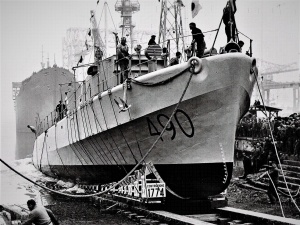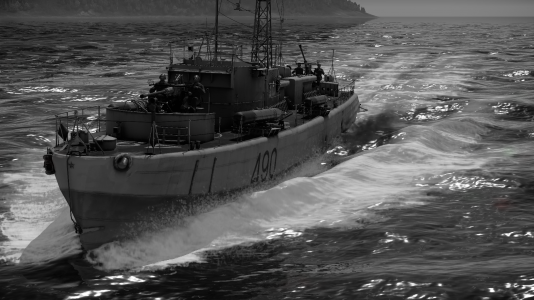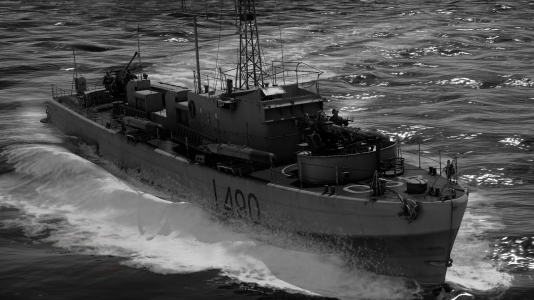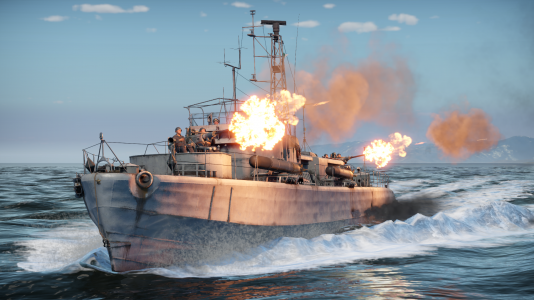Difference between revisions of "MC-490"
Jareel_Skaj (talk | contribs) m (→Pros and cons) |
Jareel_Skaj (talk | contribs) |
||
| Line 73: | Line 73: | ||
<!-- ''Describe the technique of using this ship, the characteristics of her use in a team and tips on strategy. Abstain from writing an entire guide – don't try to provide a single point of view, but give the reader food for thought. Talk about the most dangerous opponents for this vehicle and provide recommendations on fighting them. If necessary, note the specifics of playing with this vehicle in various modes (AB, RB, SB).'' --> | <!-- ''Describe the technique of using this ship, the characteristics of her use in a team and tips on strategy. Abstain from writing an entire guide – don't try to provide a single point of view, but give the reader food for thought. Talk about the most dangerous opponents for this vehicle and provide recommendations on fighting them. If necessary, note the specifics of playing with this vehicle in various modes (AB, RB, SB).'' --> | ||
| − | The '''MC-490''' | + | The '''MC-490''' plays similarly to [[MS-473]], trading higher battle rating for added torpedoes and a slightly better survivability. |
| − | + | Main guns remain to be the weapons of choice against enemy coastal vessels. An excellent ballistics of the 40 mm Bofors makes it possible to engage enemy torpedo boats at a considerable range, and makes it more likely to be the first one landing the shots on target. The ship is best used at an angle, rather than a full broadside - just enough to let both guns fire on target, but still bow-tanking most of the incoming fire. | |
| − | + | Torpedoes are best used ''without'' Torpedo Mode modification installed, as it makes them much faster, which is a huge advantage in the BR where destroyers and frigates alike are relatively manoeuvrable and can easily avoid slow torpedoes. Of course, the best way to make use of the vessel's torpedoes is to get very close to an enemy ship without them noticing and fire at close range. Islands, wrecks, or even other friendly vessels can be used to achieve that result. | |
| − | + | '''Specific enemies worth noting''' | |
| − | + | * '''[[M-17]]''' a very survivable, decently manoeuvrable vessel with a boat spawn and a heavy armament of a secondary 20 mm guns. It's extremely difficult to destroy with a use of Bofors, while itself can kill MC-490 without any attention from the player controlling it. Typically, attacks on it are suicidal, with a parallel approach and a full torpedo spread being often necessary for the kill. | |
| − | + | * '''[[RN Gabbiano]]''' is another vessel that's nearly immune to Bofors, while getting boat spawn and having a dangerous secondary armament. Here, the key is to disable the primary gun, as the [[100 mm/47 O.T.O. Mod. 1937 (100 mm)|100 mm]] can one-shot you. | |
| − | + | * '''[[USS Douglas]]''', a rare opponent but very dangerous. Best killed by indirect Bofors fire above the islands, otherwise should be avoided when possible. | |
| − | + | * '''[[Pr. 206]]''' is a similarly rare opponent to Douglas, but even more dangerous - its [[AK-230 (30 mm)|30 mm AK-230]] can kill MC-490 before it has a chance to do as much as a turn. The only option to counter it, is with the use of indirect arcing fire above the islands or Artillery Support. Otherwise, you should stay two steps ahead, and go to the opposite side of the map Pr. 206 is going. | |
| − | |||
=== Pros and cons === | === Pros and cons === | ||
| Line 91: | Line 90: | ||
'''Pros:''' | '''Pros:''' | ||
| − | * | + | * Excellent main guns. |
| − | * Good survivability | + | * Good survivability for a boat of its size. |
| − | |||
'''Cons:''' | '''Cons:''' | ||
* Its large size could be disadvantageous in trying to avoid enemy fire. | * Its large size could be disadvantageous in trying to avoid enemy fire. | ||
| − | + | * No anti-aircraft armament, requiring you to always manually aim at the airplanes. | |
| − | * No anti-aircraft armament. | ||
* Loss much speed when turning. | * Loss much speed when turning. | ||
| − | * Easy target for enemy planes, can be killed | + | * Easy target for enemy planes, can be killed even with the 12.7mm guns. |
== History == | == History == | ||
| − | <!-- ''Describe the history of the creation and combat usage of the ship in more detail than in the introduction. If the historical reference turns out to be too long, take it to a separate article, taking a link to the article about the ship and adding a block "/History" (example: <nowiki>https://wiki.warthunder.com/(Ship-name)/History</nowiki>) and add a link to it here using the <code>main</code> template. Be sure to reference text and sources by using <code><nowiki><ref></ref></nowiki></code>, as well as adding them at the end of the article with <code><nowiki><references /></nowiki></code>. This section may also include the ship's dev blog entry (if applicable) and the in-game encyclopedia description (under <code><nowiki>=== In-game description ===</nowiki></code>, also if applicable).'' -->[[File: | + | <!-- ''Describe the history of the creation and combat usage of the ship in more detail than in the introduction. If the historical reference turns out to be too long, take it to a separate article, taking a link to the article about the ship and adding a block "/History" (example: <nowiki>https://wiki.warthunder.com/(Ship-name)/History</nowiki>) and add a link to it here using the <code>main</code> template. Be sure to reference text and sources by using <code><nowiki><ref></ref></nowiki></code>, as well as adding them at the end of the article with <code><nowiki><references /></nowiki></code>. This section may also include the ship's dev blog entry (if applicable) and the in-game encyclopedia description (under <code><nowiki>=== In-game description ===</nowiki></code>, also if applicable).'' -->[[File:Motocannoniera MC 490.jpg|thumb|Launching of the MC 490 in January 1954 at Monfalcone shipyard.]] |
The first sea trials revealed a marked tendency to raise the bow, with a consequent loss of speed due to the excessive strain, so that in order to increase the thrust of the aft area, a special "bottazzo" structure was applied in the shipyard, which resulted in an extension of the living structure towards the stern, bringing the overall length of the unit from 37.2 m to 39.4 m. | The first sea trials revealed a marked tendency to raise the bow, with a consequent loss of speed due to the excessive strain, so that in order to increase the thrust of the aft area, a special "bottazzo" structure was applied in the shipyard, which resulted in an extension of the living structure towards the stern, bringing the overall length of the unit from 37.2 m to 39.4 m. | ||
| Line 112: | Line 109: | ||
The armament in the new configuration saw the replacement of the [[Bofors L/60 Mark 3 (40 mm)|40 mm Bofors L/60 Mark 3]] cannons, with the [[40 mm/70 Breda-Bofors type 107 (40 mm)|40 mm/70 Breda-Bofors]], the modification of the ferro guides to allow the embarkation of fourteen bottom mines, equipped with disposable trolleys, instead of twelve, while the original torpedo launchers were not embarked. The armament of the unit could not be defined as completely convertible, since the different operational predisposition did not contemplate the momentary disembarkation of weapons and equipment. A factor which was negatively reflected in this phase of use, with the displacement and encumbrance of the bridge. The configuration of the torpedo boat did not contemplate the embarkation of bottom mines, while in the configuration of the torpedo boat and minelayer torpedoes were not embarked. | The armament in the new configuration saw the replacement of the [[Bofors L/60 Mark 3 (40 mm)|40 mm Bofors L/60 Mark 3]] cannons, with the [[40 mm/70 Breda-Bofors type 107 (40 mm)|40 mm/70 Breda-Bofors]], the modification of the ferro guides to allow the embarkation of fourteen bottom mines, equipped with disposable trolleys, instead of twelve, while the original torpedo launchers were not embarked. The armament of the unit could not be defined as completely convertible, since the different operational predisposition did not contemplate the momentary disembarkation of weapons and equipment. A factor which was negatively reflected in this phase of use, with the displacement and encumbrance of the bridge. The configuration of the torpedo boat did not contemplate the embarkation of bottom mines, while in the configuration of the torpedo boat and minelayer torpedoes were not embarked. | ||
| − | + | ||
The unit, which returned to service in 1964, was renamed Folgore on September 1, 1965, when the Navy abandoned the custom of indicating torpedo boats with an alphanumeric code and assigned a name to each unit of this type. | The unit, which returned to service in 1964, was renamed Folgore on September 1, 1965, when the Navy abandoned the custom of indicating torpedo boats with an alphanumeric code and assigned a name to each unit of this type. | ||
Revision as of 18:12, 27 June 2024
Contents
Description
During the post-war period, Italy began to experiment with new coastal units capable of adapting their armament to various roles as needed. This led to the development of the convertible Motosilurante, which could quickly change their armament in port to enhance combat capabilities and support coastal units. The first examples of convertible Motosilurante were the MS boats from World War II, which underwent significant modifications. Subsequently, the unique MC-490 was built, equipped with new armament systems. The development continued with the Lampo and Freccia classes.
The MC-490, launched on June 21, 1954 and commissioned on August 1, 1955, primarily served as a test platform for navigation and convertible armament. It was later renamed as P-490 and had its old 40 mm Bofors guns replaced with the 40 mm Breda-Bofors. It remained in service until its decommissioning on October 15, 1976.
Introduced in Update "Starfighters", the MC-490 is a convertible torpedo boat armed with two single 40 mm Bofors guns. These guns are highly effective against most targets, except for large ships. In such cases, targeting the engine room with armour-piercing rounds can cause significant crew loss on the enemy vessel. Additionally, the MC-490 is equipped with four torpedoes, offering the chance to destroy destroyers and light cruisers. The boat possesses good manoeuvrability and speed. While the boat can withstand several hits, it is only resilient against small-calibre shots. It is advisable to flank the enemy by navigating between islands and utilizing obstacles.
General info
Survivability and armour
The MC-490 is fairly well-defended for a boat of its size. Although it does not have any armour plating, its internal modules are well-placed to increase survivability. The ammunition storage is located beneath the waterline, making detonation unlikely. One of its fuel tanks is also located below the waterline. With this protection, the MC-490 can survive a good number of hits from low-calibre guns. However, the main calibre rounds fired by destroyers and other large ships will have no difficulty in destroying or at least dealing great damage to this vessel.
With its modest 38-man crew, the Folgore finds itself in a modestly balanced position among its most common contenders. The Folgore often finds itself against the American 89 ft PT-810; the German MZ1; the Soviet Groza and MBK pr.186 and finally the Japanese Type 11. Of these five, the most dangerous were the PT-810 and Type 11 because with their Bofors L/60 Mark 3 (40 mm) automatic cannons they are able to inflict a considerable amount of damage on the MC-490.
Mobility
The propulsion is four diesel engines on four axles with a total power of 10,000 hp that allows for a speed of 65 km/h (35 knots) with a range of 629 miles. The modernisation saw the substitution from the main previous engine type MB511 of 2,500 hp with all new types of engines called MB 518 which provided 3,000 hp for a total power of 12,000 hp, it allowes the boat to reach a speed of 38 knots with a range of 700 miles thanks to the greater quantity of embarked fuel, passed from 22 to 30 tons.
With its remarkable agility it can move the rudder from left to right in 3.5 seconds and once it has reached the maximum speed it can make a U-turn in 20 seconds.
It has a maximum speed of 66 km/h while in reverse it reaches -25 km/h. Compared to other the ships at its battle rating this is one of the slowest ships for reverse speeds, but this does not mean that it is not a good ship. Don't go backwards, go forwards!
| Mobility Characteristics | |||
|---|---|---|---|
| Game Mode | Upgrade Status | Maximum Speed (km/h) | |
| Forward | Reverse | ||
| AB | |||
| Upgraded | 93 | 35 | |
| RB/SB | |||
| Upgraded | 67 | 25 | |
Modifications and economy
Armament
Primary armament
The two Bofors cannons on the MC-490 are both fully traversable, and have a good traverse rate of 30 degrees per second. They are able to easily destroy any small vessel that the MC-490 may face in battle. If necessary, they can be used against destroyers, if it is not possible to use the MC-490 torpedoes, but this is less effective.
The two Bofors L/60 Mark 3 (40 mm) have a great rate of fire 150 rounds per minute and can easily destroy anything within an 800 m radius.
One of the cannons is located at the bow of the ship, while the other is located at the stern. This means that it is sometimes not possible to fire both at the same target simultaneously. Engaging broadside eliminates this issue, but of course, makes the MC-490 a larger target for the enemy to hit.
- Universal: AP-T · HEFI-T
- 40 mm HE clips: HEFI-T · HEFI-T · HEFI-T · AP-T
- 40 mm AP clips: AP-T · AP-T · AP-T · HEFI-T
| Penetration statistics | |||||||
|---|---|---|---|---|---|---|---|
| Ammunition | Penetration @ 0° Angle of Attack (mm) | ||||||
| 10 m | 100 m | 500 m | 1,000 m | 1,500 m | 2,000 m | ||
| HEFI-T | 3 | 3 | 3 | 3 | 3 | 3 | |
| AP-T | 81 | 78 | 68 | 58 | 49 | 41 | |
| Shell details | ||||||||||||
|---|---|---|---|---|---|---|---|---|---|---|---|---|
| Ammunition | Velocity (m/s) |
Projectile mass (kg) |
Fuse delay (m) |
Fuse sensitivity (mm) |
Explosive mass (TNT equivalent) (g) |
Ricochet | ||||||
| 0% | 50% | 100% | ||||||||||
| HEFI-T | 874 | 0.9 | 0 | 0.1 | 67.13 | 79° | 80° | 81° | ||||
| AP-T | 874 | 0.89 | - | - | - | 47° | 60° | 65° | ||||
Additional armament
This vessel's four torpedoes are best used against large, slow, cumbersome targets such as destroyers, minesweepers and barges. They will do significant damage if they hit, a weak spot. Unfortunately these are the slowest (81 km/h) at this battle rating compared with the English (84 km/h) and American (85 km/h). The 4 torpedoes are positioned on the 2 sides of the ship and offer only a non-directable frontal launch.
| Torpedo Characteristics | |||||||
|---|---|---|---|---|---|---|---|
| Torpedo Mode | Mass (kg) | Maximum speed in water (km/h) | Travel distance (km) | Depth stroke (m) | Arming distance (m) | Explosive type | Explosive mass (kg) |
| No | 930 | 81 | 3.00 | 1 | 50 | TNT | 200 |
Usage in battles
The MC-490 plays similarly to MS-473, trading higher battle rating for added torpedoes and a slightly better survivability.
Main guns remain to be the weapons of choice against enemy coastal vessels. An excellent ballistics of the 40 mm Bofors makes it possible to engage enemy torpedo boats at a considerable range, and makes it more likely to be the first one landing the shots on target. The ship is best used at an angle, rather than a full broadside - just enough to let both guns fire on target, but still bow-tanking most of the incoming fire.
Torpedoes are best used without Torpedo Mode modification installed, as it makes them much faster, which is a huge advantage in the BR where destroyers and frigates alike are relatively manoeuvrable and can easily avoid slow torpedoes. Of course, the best way to make use of the vessel's torpedoes is to get very close to an enemy ship without them noticing and fire at close range. Islands, wrecks, or even other friendly vessels can be used to achieve that result.
Specific enemies worth noting
- M-17 a very survivable, decently manoeuvrable vessel with a boat spawn and a heavy armament of a secondary 20 mm guns. It's extremely difficult to destroy with a use of Bofors, while itself can kill MC-490 without any attention from the player controlling it. Typically, attacks on it are suicidal, with a parallel approach and a full torpedo spread being often necessary for the kill.
- RN Gabbiano is another vessel that's nearly immune to Bofors, while getting boat spawn and having a dangerous secondary armament. Here, the key is to disable the primary gun, as the 100 mm can one-shot you.
- USS Douglas, a rare opponent but very dangerous. Best killed by indirect Bofors fire above the islands, otherwise should be avoided when possible.
- Pr. 206 is a similarly rare opponent to Douglas, but even more dangerous - its 30 mm AK-230 can kill MC-490 before it has a chance to do as much as a turn. The only option to counter it, is with the use of indirect arcing fire above the islands or Artillery Support. Otherwise, you should stay two steps ahead, and go to the opposite side of the map Pr. 206 is going.
Pros and cons
Pros:
- Excellent main guns.
- Good survivability for a boat of its size.
Cons:
- Its large size could be disadvantageous in trying to avoid enemy fire.
- No anti-aircraft armament, requiring you to always manually aim at the airplanes.
- Loss much speed when turning.
- Easy target for enemy planes, can be killed even with the 12.7mm guns.
History
The first sea trials revealed a marked tendency to raise the bow, with a consequent loss of speed due to the excessive strain, so that in order to increase the thrust of the aft area, a special "bottazzo" structure was applied in the shipyard, which resulted in an extension of the living structure towards the stern, bringing the overall length of the unit from 37.2 m to 39.4 m.
Later in 1957, in order to dampen the splashes of water generated during navigation at high speed and in slightly rough seas, at the Arsenal of Taranto shipyard located, the bridge was equipped with a plexiglass windshield and at the bow given a splash guard, to prevent the waves from splashing over and preventing the ship from gaining water. The coeval corvette Sentinel, built in the same yard had recorded similar problems.
In 1959 to 1960 ferro guides were added for twelve mines. Despite numerous changes made during the fifties, the unit did not respond in a complete way to the nautical characteristics expected at the time of design and in June 1962 entered the shipyard at the Military Arsenal of Taranto for a radical reconstruction. The transformation works ended at the end of 1963.
The armament in the new configuration saw the replacement of the 40 mm Bofors L/60 Mark 3 cannons, with the 40 mm/70 Breda-Bofors, the modification of the ferro guides to allow the embarkation of fourteen bottom mines, equipped with disposable trolleys, instead of twelve, while the original torpedo launchers were not embarked. The armament of the unit could not be defined as completely convertible, since the different operational predisposition did not contemplate the momentary disembarkation of weapons and equipment. A factor which was negatively reflected in this phase of use, with the displacement and encumbrance of the bridge. The configuration of the torpedo boat did not contemplate the embarkation of bottom mines, while in the configuration of the torpedo boat and minelayer torpedoes were not embarked.
The unit, which returned to service in 1964, was renamed Folgore on September 1, 1965, when the Navy abandoned the custom of indicating torpedo boats with an alphanumeric code and assigned a name to each unit of this type.
The vessel, assigned to COMOS, the motor gunboat section of the III Naval Division, was decommissioned on October 1st, 1976 and the ship was decommissioned on October 15th. The initials P-490 were assigned to the patrol boat Comandante Cigala Fulgosi of the Comandanti class.
Name and armament changes:
- In 1954, it was called Motocannoniera convertibile 490 (MC.490) (ENG trans. Convertible Motor Gunboat 490)
- In 1965, it was called Pattugliatore 490 (P-490) (ENG trans. Patrol boat 490)
Media
- Skins
- Images
See also
Links to articles on the War Thunder Wiki that you think will be useful for the reader, for example:
- reference to the series of the ship;
- links to approximate analogues of other nations and research trees.
External links
Paste links to sources and external resources, such as:
- topic on the official game forum;
- other literature.
| Cantieri Riuniti dell'Adriatico (C.R.D.A) | |
|---|---|
| Motor Torpedo/Gun Boats | |
| Motosilurante CRDA 60 t Type I | MS-15 · MV-611* |
| Motosilurante CRDA 60 t Type II | MS-53 |
| Motosilurante CRDA 60 t Convertibile | MS-472 · MS-473 |
| Folgore-class | MC-490 |
| Freccia-class | Saetta P-494 |
| Light Cruisers | |
| Etna-class | RN Etna |
| *MS-11 converted to a motovedette (patrol boat) | |
| Italy boats | |
|---|---|
| Motor torpedo boats | MC-490 · Freccia P-493 · MAS 555 · MAS 561 · MAS 569 |
| MS-15 · MS-53 · MS-472 · Stefano Turr · VAS 201 · GIS 811 · MS 444 · MC 485 | |
| Motor gun boats | MAS 441 · MS-473 · MV-611 · Alano · Sparviero |
| Motor torpedo gun boats | Saetta P-494 |
| Gunboats | Albatros · Alcione |


